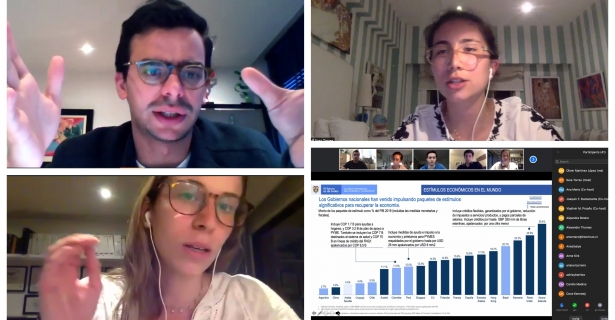The Tufts Latin American Committee (LAC) hosted two public officials from the Colombian government to discuss the country's response to COVID-19 for its first virtual event on April 27. Alejandra Botero, counselor for management and compliance of the republic of Colombia, and Henrique Sosa, advisor on economic integration of migrants and promotion of national employment, spoke on the actions that the Colombian government has taken to address the pandemic. Both speakers emphasized the importance of timeliness and cost-benefit analysis in the decision-making behind and execution of the government’s actions to mitigate the social and economic impact of the COVID-19 crisis.
Botero began by outlining a timeline of the pandemic’s progression in Colombia, citing Colombia’s advantage in being able to learn from the responses of other countries that were hit by the virus first. From this position, Colombia has managed to keep its death rate relatively low by implementing measures such as obligatory confinement, which was put into effect two weeks after the first case was documented in Colombia. Botero continued by highlighting different programs that the government has created in the past month, such as Ingreso Solidario, which lifted data protections in order to locate and transfer money to those who need it most at a rate that would have been impossible before the pandemic. Referring to Colombia’s latest move to open some of its industries, Botero cited the goal of conducting an “intelligent opening” through initiatives that have a high impact on the economy in order to preserve a competitive market and a low rate of contagion.
Sosa elaborated on the measures described by Botero, providing a management perspective on Colombia’s response at the national level. Sosa identified the primary public administrative challenges faced in addressing the crisis, including how to conduct quick decision making as a state, overcoming the conventional segmentation of state bureaucracies, and how to maintain the government’s execution capacity at its peak. Sosa then described how the Colombian government has confronted these challenges through the formation of committees that have brought members of different fields and agencies to work together in the same room. Through the designation of a committee to set an agenda and another to execute the agenda’s plans, Sosa said that the government has increased its potential to overcome barriers to efficient communication and the amplification of its responses.
Questions from the event’s 40-member audience moved the discussion on Colombia’s pandemic response to an international context. Asked how Venezuelan migrants and refugees have been taken into account during the pandemic, Sosa noted that there has been a shift in priorities from the economic integration of Venezuelans to the provision of humanitarian assistance, such as maintaining an open humanitarian corridor in the otherwise closed border between Venezuela and Colombia and integrating Venezuelans into Colombia’s social safety net. Further questions moved the conversation from international cooperation to competition. Sosa described the reorientation of domestic industries and capacities that has taken place in order to produce resources such as ventilators and Personal Protective Equipment given the shortage that has resulted from the high demand for these goods globally.
Despite the variation in how countries have responded to the COVID-19 crisis, there exists a continuity in the uncertainties that all nations face today. No matter the extent of a country’s resources or the timeliness of its response, the future is uncertain. Botero’s and Sosa’s experiences provided invaluable insight into how a key actor in the region has faced the challenges presented by the pandemic thus far, as well as the actions Colombia will take going forward.

